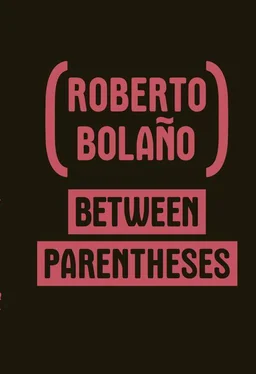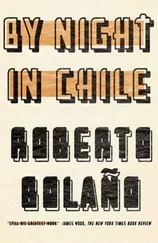Roberto Bolaño - Between Parentheses - Essays, Articles and Speeches, 1998-2003
Здесь есть возможность читать онлайн «Roberto Bolaño - Between Parentheses - Essays, Articles and Speeches, 1998-2003» весь текст электронной книги совершенно бесплатно (целиком полную версию без сокращений). В некоторых случаях можно слушать аудио, скачать через торрент в формате fb2 и присутствует краткое содержание. Год выпуска: 2011, Издательство: New Directions, Жанр: Публицистика, Критика, на английском языке. Описание произведения, (предисловие) а так же отзывы посетителей доступны на портале библиотеки ЛибКат.
- Название:Between Parentheses: Essays, Articles and Speeches, 1998-2003
- Автор:
- Издательство:New Directions
- Жанр:
- Год:2011
- ISBN:нет данных
- Рейтинг книги:4 / 5. Голосов: 1
-
Избранное:Добавить в избранное
- Отзывы:
-
Ваша оценка:
- 80
- 1
- 2
- 3
- 4
- 5
Between Parentheses: Essays, Articles and Speeches, 1998-2003: краткое содержание, описание и аннотация
Предлагаем к чтению аннотацию, описание, краткое содержание или предисловие (зависит от того, что написал сам автор книги «Between Parentheses: Essays, Articles and Speeches, 1998-2003»). Если вы не нашли необходимую информацию о книге — напишите в комментариях, мы постараемся отыскать её.
The Savage Detectives
Between Parenthese
Between Parentheses: Essays, Articles and Speeches, 1998-2003 — читать онлайн бесплатно полную книгу (весь текст) целиком
Ниже представлен текст книги, разбитый по страницам. Система сохранения места последней прочитанной страницы, позволяет с удобством читать онлайн бесплатно книгу «Between Parentheses: Essays, Articles and Speeches, 1998-2003», без необходимости каждый раз заново искать на чём Вы остановились. Поставьте закладку, и сможете в любой момент перейти на страницу, на которой закончили чтение.
Интервал:
Закладка:
But in this first volume of the Obras completas readers will also find other, lesser known books, like The Captain’s Verses, the love poems of a mature Neruda who embarks on a new love affair with characteristic abandon; or the poems of Las uvas y el viento , postcards from a man naively or stubbornly blind as he travels the length and breadth of the Soviet Union and notices nothing, absolutely nothing, belying the vaunted notion of a poet’s instinct, because poets may sometimes be beggars or adventurers in their hearts, but most of the time they are courtesans; or Tentativa del hombre infinito [Venture of the Infinite Man], a young Neruda full of discoveries; or one of his least known books, El habitante y su esperanza [The Inhabitant and His Hope] from 1926, which Neruda calls a “novel,” and which may very well be one, an interesting book, of poetic prose with one foot in modernism and the other in the avant-garde, a book of formal inventiveness and mannerisms, of weaknesses and taut gestures.
PEZOA VÉLIZ
Pezoa Véliz is without a doubt the quintessential minor poet of the Chilean Parnassus and also one of the most mysterious, to begin with because of his last name, which some spell with a z and others with an s. Armando Donoso, one of the first experts on his work, although here the word expert is clearly an overstatement, introduces him by saying that he wasn’t much of a poet, author of only three decent poems. Then he calls him a layabout, a more or less conscious plagiarist, a social climber, and an opportunist, although at the same time he spends more than two pages challenging the claim that he was a bastard or born out of wedlock, a charge that weighed heavily on the poet and that Armando Donoso relies on letters to clear up with more vigor than objectivity.
In the Chile of 1927, date of the publication of Poesías y prosas completas [Complete Poems and Prose] by Carlos Pezoa Vélis (Nascimiento, compiled and with an introduction by Armando Donoso, who, one gathers, was a somebody back then and today is a nobody) and nineteen years after the poet’s death at the age of twenty-eight, whether he was or was not a bastard wasn’t a trivial matter. And Donoso tackles the affair with an energy that today looks neurotic. Given historians of this caliber, it’s almost better to be forgotten.
Nevertheless — and here Donoso doesn’t err — certain facts are inescapable. Pezoa was poor all his life. He had a mother who was less a mother than a gypsy curse. His education was lacking. His poetry suffers from almost all the tics of modernism and possesses few of its virtues. His relationships with women were complicated. His relationship with society was impossible: in the end, Pezoa, like so many writers, simply wanted to get ahead, although to reach this point he had to go through stages as contradictory as anarchism, which seduced him, and bureaucracy, where he found peace of mind, a salary, basic sustenance, and some time to write. The stories that survive him are the kind that bring a person to tears: a Chile in black and white, as if the country had never existed. But he wrote more than three good poems (maybe six or seven), and one really good one, “Tarde en el hospital” [Afternoon in the Hospital], perhaps shortly before he died. And there he remains, in his hospital bed, melancholy Pezoa Véliz.
UNA CASA PARA SIEMPRE
When Enrique Vila-Matas’s Una casa para siempre [A Home Forever] (Anagrama, 1988) was published, two critics blasted it. The first said it was a terrible novel. The second said it was the kind of book that should never have been written. By all indications, readers took the critics at their word, and the fate of the novel was sealed. Some years later, however, it was translated into French and was chosen, along with a novel by Javier Marías, as one of France’s books of the year.
Today, when so much water has passed under the bridges of Spain and France, and when Vila-Matas’s excellence is an undisputed fact, the fate of Una casa para siempre remains unchanged, though it’s a book praised by writers like Rodrigo Fresán and Juan Villoro. The first edition, which has yet to sell out, is still on the shelves of some bookstores; the book, which is about ventriloquists and daily acts of subversion, still lives in the proud limbo of books marked by a fate not theirs, though they, the books, accept it with a courage some national heroes might envy.
What is Una casa para siempre? A tragedy and a comedy. An epiphany and a call to the guillotine. A Vila-Matas novel in its purest and most gracious state. The drama of a ventriloquist with a voice of his own, for some writers a virtue to be constantly yearned for and sought, but for the ventriloquist a curse, for obvious reasons. Style is a fraud, said De Kooning, and Vila-Matas agrees. To have a voice of one’s own is a blessing, whether one is a writer, painter, or ventriloquist, but it can lead or perhaps in fact inevitably leads to conformism, flatness, monotony. Every work, Vila-Matas tells us, peering out at us from the pages of this book, should be a fresh leap into the void. Whether anyone is watching or not.
GRASS'S CENTURY
From a writer like Günter Grass, one expects a masterpiece even on his deathbed, though by all indications My Century (Alfaguara) will be only the second-to-last of his great books. It’s a collection of short stories, one for each year of the century now behind us, in which the great German writer examines the frequently tortured fate of his country. From the first soccer teams to World War I, from the economic crisis of the twenties to the rise of Nazism, from World War II and the concentration camps to the German Miracle, from the post-war period to the fall of the Berlin Wall, everything has a place in this book, which manages to seem short though it’s more than four hundred pages long, perhaps because the succession of horrors, the succession of disasters, and the human instinct for survival despite everything make it feel that way: the century has exhaled.
The Grass of this book, of course, isn’t the Grass of The Tin Drum or of Dog Years or The Flounder , to mention just three of his great and all-encompassing works. Here we have before us a crepuscular and fragmentary Grass, as merited by the occasion, and also a seemingly (though only seemingly) weary Grass, who embarks on the review of his German century, which is also the European century, with the conviction of having traversed an enduring piece of hell and also with the certainty, the old and maligned and magnificent certainty of the Enlightenment, that human beings deserve to be saved, even though often they aren’t saved. We’re exiting the twentieth century marked by fire. That’s what Grass tells us. And he tells it in some wonderful stories, alive with humor and pain, written as if by a young man of thirty, full of energy and with a long life ahead of him.
THE RHAPSODE OF BLANES
Don Josep Ponsdomènech is eighty-eight and sometimes I see him sunning himself in the square next to the Joaquim Ruyra School, at noon, when I come to pick up my son. It’s just a wayside stop for him, because Don Josep Ponsdomènech is tall and lean and he’s always on the move, from the Plaza de Cataluña to the port, from the Avinguda de Dintre to the narrow streets of the town center, where the sun rarely shines. By trade he’s a poet, a rhapsode, he says, and he’s comfortable in the role, at peace with it. His pockets are full of paper on which he writes his daily poems in elegant copperplate. Some he writes just because, inspired by the muses; other times he writes to alleviate suffering or to quiet memories. But always he writes in a spirit of hope, convinced that poetry possesses healing powers. If a woman has lost her husband, for example, Don Josep Ponsdomènech writes her a poem that lauds the deceased while at the same time reminding the widow of the need to keep living. Even those who die utterly alone have their poems.
Читать дальшеИнтервал:
Закладка:
Похожие книги на «Between Parentheses: Essays, Articles and Speeches, 1998-2003»
Представляем Вашему вниманию похожие книги на «Between Parentheses: Essays, Articles and Speeches, 1998-2003» списком для выбора. Мы отобрали схожую по названию и смыслу литературу в надежде предоставить читателям больше вариантов отыскать новые, интересные, ещё непрочитанные произведения.
Обсуждение, отзывы о книге «Between Parentheses: Essays, Articles and Speeches, 1998-2003» и просто собственные мнения читателей. Оставьте ваши комментарии, напишите, что Вы думаете о произведении, его смысле или главных героях. Укажите что конкретно понравилось, а что нет, и почему Вы так считаете.












